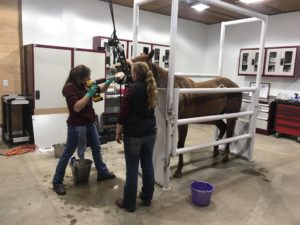
I had a recent question from a reader. From DeAnna: “Curious what your thoughts are on vets using hand tools compared to electric tools. I have had different vets float my horses with electric tools as well as floated using hand tools. I have had both good and bad experiences from both, but do you have a preference of one over the other?”
Questions to consider when having your horse floated:
Does my vet use stocks?
I understand it is not always possible, and that your vet can do a good job without them, but I am a stickler for my horses being floated in a set of stocks. I will generally haul in to the clinic for my floats. Not having the horse in a set of stocks will sometimes keep the vet from using as much sedation as they really need to get the horse to stand calmly for the float. My horse, Sedona, needed a very stubborn wolf tooth pulled this last visit and I was very thankful for having hauled in.
Does my vet use extra lighting?
I always look for a vet who uses a light clipped near the horses mouth, giving them a really good view of what is going on. I have seen vets that do this and vets that don’t.
Does my vet let me visually and physically inspect my horse’s mouth?
Another important thing is for the vet to allow me to physically look in the horse’s mouth before and after the float. If they aren’t letting you see, or their equipment makes it impossible for you to get a good look, chances are they can’t see very well either. You will also be able to see if any damage has been done to the soft tissue in the mouth during the float. Regardless if it is a hand float or a power float, no damage should be done to your horse’s mouth.
Why did vets switch to power floats?
Using a power float saves time and stress on the horse. Especially if they are a trickier case, or an older horse who hasn’t had a float in a while. It also is less fatiguing for the vet, so they are able to do more floats in a day without wearing out. A sore arm could cause your horse to not have received as thorough of a float as you had hoped!
I keep saying Vet…
You guessed it, I prefer a licensed DVM to preform my floats. I look for one that has really spent the extra time understanding dental work and is very skilled.
One of my least favorite things about hand tools is they are generally not used by vets anymore, they are used by equine dentists. My biggest issue is the dentists can’t sedate the horses. If your horse is really sharp, needs a wolf tooth pulled or has anything painful going on in their mouth, not sedating will cause them to fling their head around, giving you an inconsistent result.
In addition, most equine dentists do not have a good view of the horse’s mouth and go mostly by feel. Which can be done, but again is not as thorough.
Why a vet?
I once had a vet tell me a story of a horse that had a stick lodged in his pallet. No one was aware of the stick until the horse was brought in for a float! The horse required extra veterinary attention to clean up the wound caused by the stick and antibiotics to clear up the infection. You never know what complications might arise during the exam!
In conclusion, I prefer a licensed DVM, skilled on equine dental and a power float. There are so many opinions on this. I would expect if I answered it either way it would be controversial! Thanks for reading and I will see you all on the next post!
Ashley Purdin
